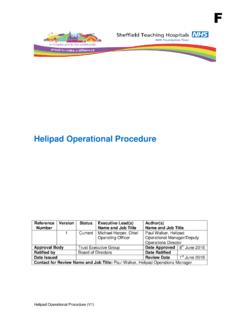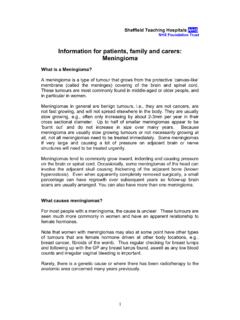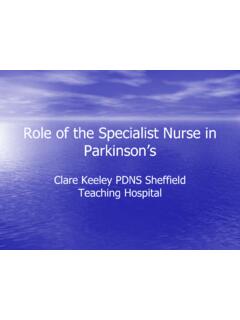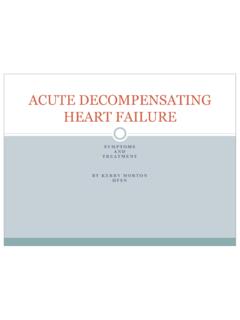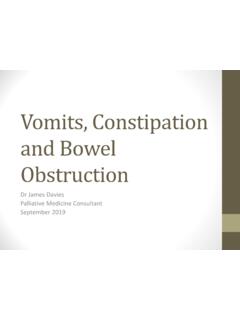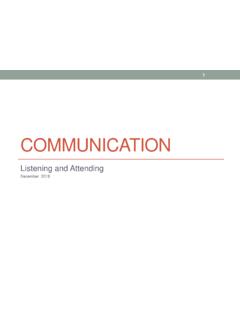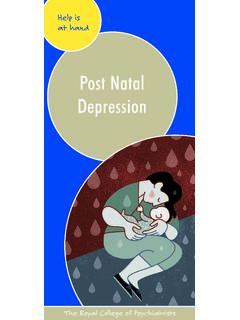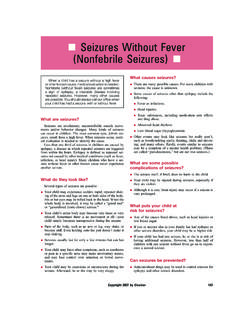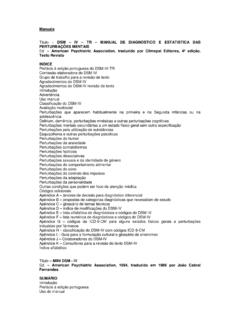Transcription of Information for patients Non-epileptic seizures
1 Non-epileptic seizuresa short guide for patients and familiesDepartment of NeurologyRoyal Hallamshire HospitalInformation for patients2 What are Non-epileptic seizures ?In a seizure people lose control of their body, often causingshaking or other movements of arms and legs, blacking out,or both. seizures can happen for different reasons. Duringepileptic seizures , the brain produces electrical impulses,which stop it from working normally. Non-epileptic seizureslook a little like epileptic seizures , but are not caused byabnormal electrical activity in the brain. Non-epileptic seizures happen because of problems withhandling thoughts, memories, emotions or sensations in thebrain.
2 Such problems are sometimes related to stress. However, they can also occur in people who seem calm andrelaxed. Often people do not understand why they havedeveloped Non-epileptic seizures . Are Non-epileptic seizures rare?For every 100,000 people, between 15 and 30 have Non-epileptic seizures . Nearly half of all people brought in tohospital with suspected serious epilepsy turn out to have Non-epileptic seizures instead. One of the reasons why you may not have heard of Non-epileptic seizures is that there are several other names for thesame problem. Non-epileptic seizures are also known aspseudoseizures, psychogenic, dissociative or functionalseizures.
3 Sometimes people who have Non-epileptic seizuresare told that they suffer from Non-epileptic attack disorder(NEAD). 3 How can I be sure that this is the rightdiagnosis? Non-epileptic seizures often look like epileptic seizures tofriends, family members and even doctors. Like epilepsy, Non-epileptic seizures can cause injuries and loss of control overbladder function. However, specialists in the treatment of seizures (neurologists,neurophysiologists or epileptologists) are sometimes able totell them apart when they are described in detail. For instance,the movements, length, triggers and frequency of Non-epileptic seizures are slightly different from epileptic some people, a firm diagnosis of Non-epileptic seizures canbe made without any tests.
4 In others, typical seizures can berecorded during an EEG (electroencephalogram) is a useful test because it can show up the electricalchanges, which are only present in epileptic attacks. Home video recordings or even photographs of a typicalseizure can sometimes help in the diagnosis. However, the most reliable test is video-EEG this test, we observe patients for several hours or evendays with a video camera and an EEG until they have aseizure. By examining the video and EEG recordings, we canmake a diagnosis with almost complete certainty. However,video-EEG monitoring can only be done if a person s attacksare frequent enough (once a week or more).
5 Sometimes wewill also use triggers during the test to make it more likelythat a seizure occurs. 4 Why was I told that I had epilepsy?More than seven out of ten people with Non-epileptic seizuresare treated with anti-epileptic drugs for several years before thecorrect diagnosis is made. This does not mean that doctors whohave treated you for epilepsy have been that the diagnosis of seizures relies on thedescriptions by observers, who may not have noticed importantdetails. Often the diagnosis becomes clearer over time, whenpeople have had a chance to observe more seizures . Also,epileptic seizures can be very harmful so, to be on the safe side,doctors may decide to start anti-epileptic drugs.
6 They may onlyrecognise that seizures are Non-epileptic when anti-epilepticdrugs do not about my abnormal EEG?One in ten completely healthy people have an EEG showing non-specific abnormalities. Such abnormalities can also becaused by anti-epileptic drugs. It is therefore not uncommonthat EEG abnormalities are seen in people with non-epilepticseizures, especially if they are taking anti-epileptic reason why the EEG may be abnormal in a person withnon-epileptic seizures is that some also have epilepsy or otherneurological brain disorders. If you have both seizure types, it isimportant that you and your family learn to tell them apart.
7 What causes Non-epileptic seizures ?We do not know precisely what mechanisms in the brain causenon-epileptic seizures . Unlike epileptic seizures , non-epilepticseizures are not the result of physical abnormalities of the they are related to emotions or stress, or they result fromupsetting experiences, sometimes from the forgotten past. 5It is well known that emotional stress can produce physicalreactions in the body. For example, everyone has blushed inembarrassment or felt their heart thump in their chest whenthey were nervous or anxious. Today, we also know that moreextreme stress can actually cause illness and disability. Non-epileptic seizures , fibromyalgia, chronic fatigue and irritablebowel syndrome are all examples of such is important to remember that people with these conditionshave real physical symptoms, which are caused by real stressesand that people do not fake them.
8 Often family members(and even health care professionals) do not understand thefact that Non-epileptic seizures are not put on . An upset,such as physical or sexual abuse, divorce, death of a lovedone, other great loss or sudden change, recently or in thedistant past, often turns out to be the first trigger. What about my other symptoms?These are some other symptoms, which people with Non-epileptic seizures can sometimes experience as part of theirillness. Often these symptoms have causes similar to Non-epileptic seizures . The symptoms are: Numbness, tingling Fatigue Pain Headache Poor concentration Memory problems Poor sleep Difficulty speaking Blurred vision Feeling distant Dizziness Limb weakness Frustration, anger Low mood Worry Panic Bladder problems Bowel problems6 What can I do to help myself get better?
9 The first step may be the hardest. People often find it verydifficult to feel comfortable with the diagnosis of Non-epileptic seizures . It is difficult for them to get better if theyare not convinced of the diagnosis. Here are some pointswhich people with Non-epileptic seizures have found helpful: A good way to think about Non-epileptic seizures is: I am not bringing my seizures on but I can help myself toget better! Find your triggers, sometimes people with non-epilepticseizures find ways of stopping their attacks. One way of finding triggers is to ask yourself - what ishappening? during a seizure. Are you frightened? Are you worried about something?
10 Make sure your friends and family understand. This can help to make seizures shorter and less and family are more likely to stay calm during anattack if they understand what s happening and you areunlikely to come to any harm. Showing them this leafletand discussing the seizures with them may help with this. Use the specialist help on offer. Although you can helpyourself to get better, your doctor may offer you anappointment with a psychologist, psychotherapist orcounsellor to discuss the causes and treatment of yourseizures. 7Do I really need to see a psychiatrist orpyschologist?Often the upsetting events or conflicts causing non-epilepticseizures have been bottled up or blocked from memory, andpeople can only work out why they have developed seizureswith the help of an expert.
